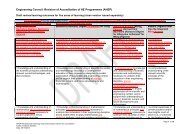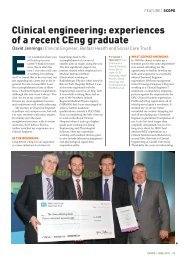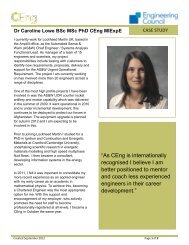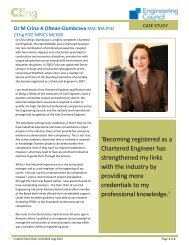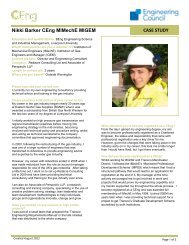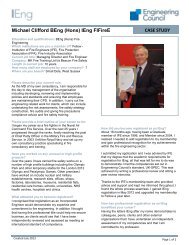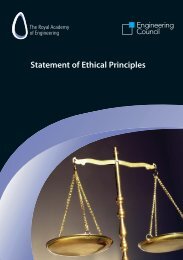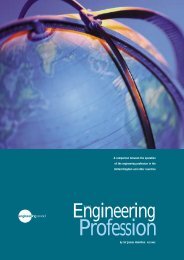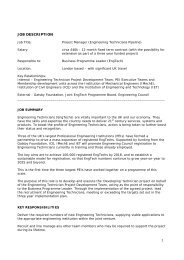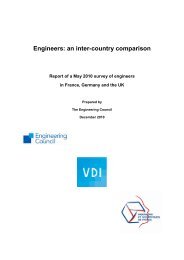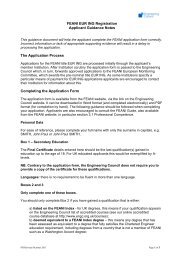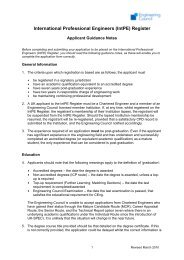An Engine for Change - A Chronicle of the Engineering Council
An Engine for Change - A Chronicle of the Engineering Council
An Engine for Change - A Chronicle of the Engineering Council
You also want an ePaper? Increase the reach of your titles
YUMPU automatically turns print PDFs into web optimized ePapers that Google loves.
106A CHRONICLE OF THE ENGINEERING COUNCIL“The result <strong>of</strong> this reorganisation was that all senior elected positions on <strong>the</strong> <strong>Engine</strong>ering<strong>Council</strong> were filled by ex-Presidents <strong>of</strong> Institutions (e.g. Alan Rudge, Robin Wilson, TonyRidley, Brian Kent etc) with o<strong>the</strong>r Presidents and ex-Presidents as members <strong>of</strong> <strong>the</strong> Senate.One would have supposed that this situation would have given <strong>the</strong> Institutions considerableinfluence over <strong>the</strong> <strong>Engine</strong>ering <strong>Council</strong> affairs, and would have given <strong>the</strong>m some sense <strong>of</strong>ownership. Un<strong>for</strong>tunately this was not so, and I heard complaints (from Institution DirectorsGeneral / Secretaries) that ex-Presidents appeared to “change <strong>the</strong>ir spots” when <strong>the</strong>y joined<strong>the</strong> <strong>Engine</strong>ering <strong>Council</strong>! Thus <strong>the</strong> criticism and ill feelings continued - ad nauseam.“There was a feeling amongst some Institutions that <strong>the</strong> <strong>Engine</strong>ering <strong>Council</strong> should havedone <strong>the</strong> basic minimum <strong>of</strong> registering <strong>of</strong> engineers, and auditing <strong>the</strong> per<strong>for</strong>mance <strong>of</strong>Institutions. The word “subsidiarity” was mentioned frequently. However subsidiarity couldbe interpreted in two ways:-i) If a task can be carried out by Institutions <strong>the</strong>n it should be.ii) If a task can be carried out better by Institutions <strong>the</strong>n it should be.“I must confess that I favoured <strong>the</strong> latter.”In May 1995, Denis Filer retired as <strong>the</strong> EngC’s Director General and was replaced by <strong>the</strong>third Director General Mike Heath CB, CBE, CEng, a Major General from REME. MikeHeath was recruited into <strong>the</strong> <strong>Engine</strong>ering <strong>Council</strong> by interview after an initial approach by amember <strong>of</strong> <strong>the</strong> <strong>Council</strong>. The interview board was chaired by Sir John Fairclough andincluded Sir Frank Holroyd, Sir Ge<strong>of</strong>frey Allen, Malcolm Hutchinson and Brian Kent. Toquote Mike Heath’s own words: “I took up <strong>the</strong> post <strong>of</strong> Director General at a critical timewhen Sir John Fairclough had concluded an epic series <strong>of</strong> negotiations with <strong>the</strong> Institutions,resulting in a Declaration <strong>of</strong> Intent that sought to unify <strong>the</strong> Pr<strong>of</strong>ession behind <strong>the</strong> leadership<strong>of</strong> <strong>the</strong> <strong>Engine</strong>ering <strong>Council</strong>. His role in this was nothing less than heroic, even though he hadnot had his own way in what was finally agreed. Decisions having been made, however, itwas my job to lead <strong>the</strong> change.”During 1995, as part <strong>of</strong> <strong>the</strong> new Director General’s policy to demonstrate that <strong>the</strong> EngC hadceased its navel gazing, Mike Heath and Brian Kent, a Senator and Chairman Designate <strong>of</strong><strong>the</strong> BEP, visited 10% <strong>of</strong> <strong>the</strong> Industry Affiliates, and <strong>the</strong> Affiliates’ own newsletter, IndustryLink was given a face-lift. The EngC’s regional organisation and links with industry and itsAffiliates were reconsidered during <strong>the</strong> year 1995. Mike Heath was anxious that <strong>the</strong> newEngC should not concentrate on internal matters and that better communication was neededwithin <strong>the</strong> pr<strong>of</strong>ession, as well as externally. It was generally agreed that <strong>the</strong> environment,transport infrastructure, communications and energy were important issues <strong>for</strong> <strong>the</strong> nation andcould be incorporated into <strong>the</strong> Government’s ‘20:20 Vision’ Programmes. In Chapter 6, weshall mention how <strong>the</strong> Joint Venture activities on <strong>the</strong>se issues were led by four <strong>of</strong> <strong>the</strong> largeInstitutions, albeit with some dissent from <strong>the</strong> smaller Institutions that specialised in <strong>the</strong>setopics that <strong>the</strong>y had, yet again, been by-passed by <strong>the</strong> larger bodies.To promote a higher pr<strong>of</strong>ile <strong>for</strong> <strong>the</strong> EngC among MPs and Peers, Mike Heath met SirMalcolm Thornton, Chairman <strong>of</strong> <strong>the</strong> Commons Select Committee <strong>of</strong> Education, and Mrs<strong>An</strong>ne Campbell, Chairman <strong>of</strong> <strong>the</strong> Parliamentary Scientific Committee. Also, members <strong>of</strong> <strong>the</strong>Commons’ Scientific and Technology Select Committee visited <strong>the</strong> EngC to be briefed onunification issues.© <strong>Engine</strong>ering <strong>Council</strong> UK 2004



